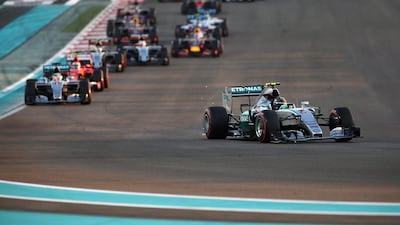Speaking on Friday, two days before the Etihad Airways Abu Dhabi Grand Prix, comments from Christian Horner, the team principal of Red Bull Racing, proved prophetic of what occurred in Sunday’s 55-lap race.
Speaking in a news conference, Horner summed up what he believes fans expect from Formula One. “I think that what they want to see is the drivers who need to be the heroes, racing wheel to wheel and competitive racing,” he said.
“Machines that are Formula One cars are truly spectacular to drive and I think Formula One is the pinnacle of motorsport and it’s competing against an awful lot of other sports that are now demanding television airtime. And it’s got to be entertaining from start to finish.
“I think that that’s what we need to be striving for, that’s what we need to be looking to achieve. Now, of course, technology plays a role but I don’t believe it needs to be the primary role. That should be about the drivers and out-and-out racing.”
Horner is absolutely right in that F1 needs to be supplying entertainment, and that was considerably lacking at Yas Marina Circuit.
It was no fault of the venue. The facilities at Yas Marina were as impressive as ever, and the 60,000 fans were out in force to watch the final race of the season.
But, they were let down by the show F1 provided as the Mercedes-GP cars of Nico Rosberg and Lewis Hamilton cantered away at the front.
The action was largely processional, the only major interest coming from seeing Sebastian Vettel’s Ferrari and Romain Grosjean’s Lotus move up from 15th and 18th, respectively, to finish fourth and ninth after both had qualified out of position.
The lack of incident was not exclusive to Abu Dhabi: this has been the story of a forgettable season, dominated by one team, and for most of it by one driver, in Hamilton, who won his third world title with three races to spare.
Horner’s words were interesting in they confronted the problem F1 has at the moment. Simply, it is not entertaining enough. A fan could count the number of truly memorable races this year on the fingers of one hand, which in a 19-race season is unacceptable.
Even more alarmingly, in only one race all year, in the United States last month, did first place change hands with an overtaking move on track.
F1 has had years like this before, and no doubt they will have them again in the future, but this year has felt particularly dispiriting.
In fairness, we had a one-sided season in 2014, but the fact Hamilton and Rosberg fought to an exciting finale in Abu Dhabi proved an effective smokescreen for the problems with the sport.
This season, with Hamilton winning 10 of the first 16 races, the smoke cleared to highlight an uncompetitive and mismatched grid where, realistically, under the current regulations, only Ferrari have a hope of matching Mercedes.
READ ALSO: How Formula One can be made more entertaining
Since the sport moved to the 1.6-litre V6 turbo engines at the start of 2014 it has become almost a private party for Mercedes. They have won 32 of the 38 races since.
Mercedes’s engineers have done a great job with the power of their engine, and only Ferrari have become to get close to them, with Renault and Honda struggling. It is fair, in a sporting sense, as Mercedes have done the best work, albeit with considerable resources behind them, that they reap those rewards on the track.
But it is does not make for good viewing, and F1 has to realise that, with global TV ratings falling. The worldwide audience slipped to 425 million, from 450, in 2014, and it is unlikely, when the figures are released for 2015 early next year, that they will have got any better.
People are telling F1 what they think and are doing it with the off button on their TV remote control. The race teams, the FIA, ruling body of motorsport; and Bernie Ecclestone, the chief executive of the sport, cannot afford to remain blind to the public’s growing apathy.
With the regulations already fixed for 2016 it is hard to see much changing, in terms of performance levels.
So another year of Mercedes fighting it out at the front, with Ferrari pushing to match them, and everyone else making up the numbers, to be blunt, hardly sounds invigorating.
F1’s issue is it is not the only show in town. When Sunday’s race was going on, sport fans could also watch Premier League football, other major football across Europe, tennis in the shape of the Davis Cup, as well as many other sports.
People have wide choices in what to view and it is hard to blame anyone switching off early in the race on Sunday.
F1 faces a big decision. Does it want to be a sport or does it want to be entertainment?
The former is pure but does not always provide a good spectacle, with the man who is fastest starting at the front, and usually winning.
But if entertainment is the driving force, then it may be time to reconsider double-points races, and to find a way to equalise the performances of the engines and car aerodynamics to find a level playing field, so that more than two drivers can be confident of winning.
Yes, some of those ideas would be artificial and the integrity of the competition would be reduced, but it may at least add in some of the unpredictability the series has lost.
It is time for F1 to think outside the box and embrace the creative.
There is no quick fix or automatic answer on how to achieve this.
But, the fans who made the effort to go to Sunday’s race deserved better entertainment. Hopefully, the series can learn from this year’s meagre offerings and be better for it in the future.
gcaygill@thenational.ae
Follow us on Twitter @NatSportUAE

